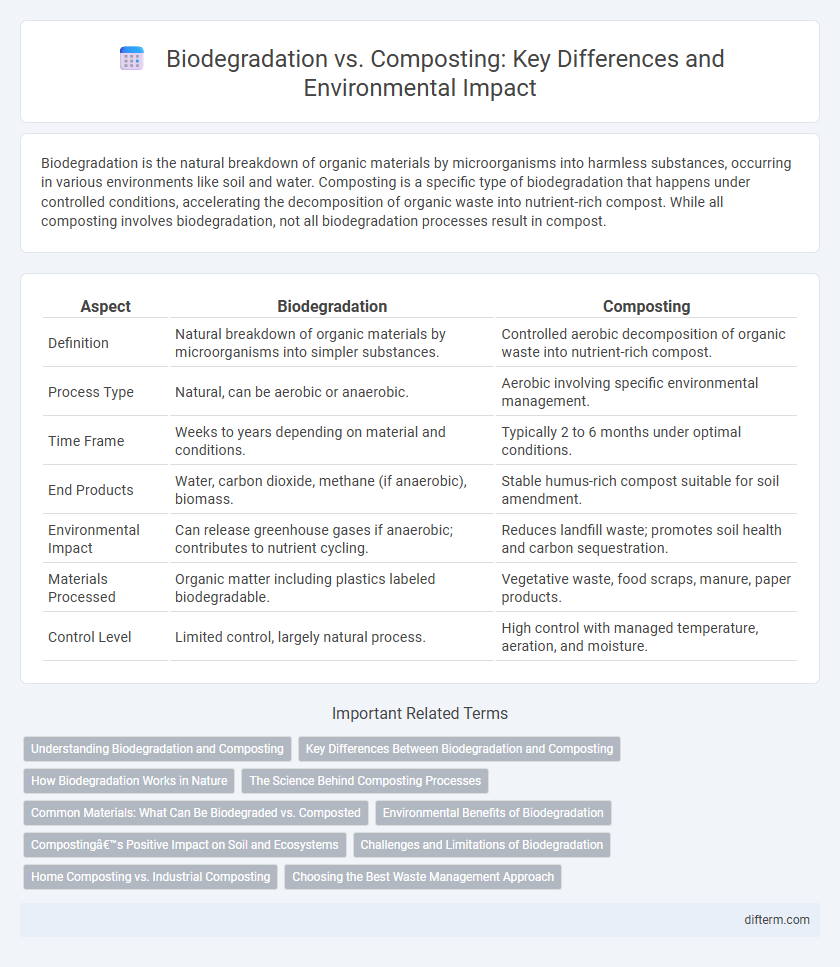Biodegradation is the natural breakdown of organic materials by microorganisms into harmless substances, occurring in various environments like soil and water. Composting is a specific type of biodegradation that happens under controlled conditions, accelerating the decomposition of organic waste into nutrient-rich compost. While all composting involves biodegradation, not all biodegradation processes result in compost.
Table of Comparison
| Aspect | Biodegradation | Composting |
|---|---|---|
| Definition | Natural breakdown of organic materials by microorganisms into simpler substances. | Controlled aerobic decomposition of organic waste into nutrient-rich compost. |
| Process Type | Natural, can be aerobic or anaerobic. | Aerobic involving specific environmental management. |
| Time Frame | Weeks to years depending on material and conditions. | Typically 2 to 6 months under optimal conditions. |
| End Products | Water, carbon dioxide, methane (if anaerobic), biomass. | Stable humus-rich compost suitable for soil amendment. |
| Environmental Impact | Can release greenhouse gases if anaerobic; contributes to nutrient cycling. | Reduces landfill waste; promotes soil health and carbon sequestration. |
| Materials Processed | Organic matter including plastics labeled biodegradable. | Vegetative waste, food scraps, manure, paper products. |
| Control Level | Limited control, largely natural process. | High control with managed temperature, aeration, and moisture. |
Understanding Biodegradation and Composting
Biodegradation is the natural process where microorganisms break down organic materials into simpler substances, often resulting in carbon dioxide, water, and biomass. Composting is a controlled form of biodegradation that optimizes conditions such as temperature, moisture, and oxygen to accelerate the transformation of organic waste into nutrient-rich compost. Understanding these processes helps in managing waste effectively while reducing environmental pollution and promoting soil health.
Key Differences Between Biodegradation and Composting
Biodegradation is the natural process where microorganisms break down organic materials into simpler substances, whereas composting is a controlled aerobic process that transforms organic waste into nutrient-rich compost. Biodegradation occurs in various environments and timescales without human intervention, while composting requires specific conditions such as temperature, moisture, and oxygen levels to optimize microbial activity. The key difference lies in composting's ability to accelerate decomposition and produce a valuable soil amendment, enhancing sustainable waste management.
How Biodegradation Works in Nature
Biodegradation in nature involves microorganisms such as bacteria and fungi breaking down organic materials into simpler compounds by enzymatic action. This process releases nutrients back into the soil, promoting ecosystem health and reducing pollution. Unlike controlled composting, natural biodegradation occurs at variable rates influenced by environmental factors like temperature, moisture, and oxygen availability.
The Science Behind Composting Processes
Composting is a controlled aerobic process where microorganisms like bacteria and fungi break down organic matter into nutrient-rich humus, releasing carbon dioxide, water, and heat. Biodegradation refers to the natural breakdown of materials by microorganisms, which can occur in both aerobic and anaerobic conditions but is typically slower and less controlled than composting. Temperature, moisture, oxygen levels, and microbial activity are critical factors that influence the efficiency and rate of the composting process.
Common Materials: What Can Be Biodegraded vs. Composted
Biodegradation involves the natural breakdown of organic materials like food scraps, paper, and certain plastics by microorganisms, whereas composting specifically refers to the controlled aerobic decomposition of organic waste such as fruit and vegetable peels, yard trimmings, and coffee grounds. Common biodegradable materials include biodegradable plastics, leather, and natural fibers, but not all are suitable for composting due to the need for specific moisture, temperature, and oxygen conditions. Proper sorting of biodegradable waste enhances compost quality by ensuring that only compostable materials like plant-based residues and untreated paper products undergo composting processes.
Environmental Benefits of Biodegradation
Biodegradation significantly reduces waste accumulation by breaking down organic materials into natural elements, minimizing landfill use and lowering greenhouse gas emissions. This process enhances soil health through the release of essential nutrients and supports ecosystems by maintaining microbial diversity. The environmental benefits of biodegradation include decreased pollution and improved sustainability in waste management practices.
Composting’s Positive Impact on Soil and Ecosystems
Composting enriches soil by increasing organic matter, enhancing nutrient availability, and improving soil structure, which promotes healthy plant growth and microbial activity. Unlike biodegradation, which simply breaks down materials, composting actively transforms waste into valuable humus that supports diverse ecosystems and reduces landfill reliance. This process contributes to carbon sequestration and mitigates soil erosion, fostering long-term environmental sustainability.
Challenges and Limitations of Biodegradation
Biodegradation faces challenges such as inconsistent degradation rates due to varying environmental conditions like temperature, moisture, and microbial activity. Many biodegradable materials require specific conditions to break down effectively, which are often absent in natural environments or landfills, leading to incomplete decomposition. Additionally, additives in products can inhibit microbial processes, resulting in persistent waste and environmental accumulation.
Home Composting vs. Industrial Composting
Home composting relies on natural microbial activity to break down organic waste in a controlled environment, typically requiring longer timeframes and producing nutrient-rich humus ideal for gardening. Industrial composting uses higher temperatures, controlled aeration, and specialized microorganisms to accelerate biodegradation, enabling the breakdown of tougher materials like bioplastics and food packaging within days. While home composting is accessible and sustainable for household organic waste, industrial composting supports large-scale waste management and reduces landfill use significantly.
Choosing the Best Waste Management Approach
Biodegradation naturally breaks down materials through microbial activity, but it varies in speed and environmental impact depending on conditions and waste type. Composting accelerates organic waste decomposition in controlled environments, producing nutrient-rich soil amendments that enhance soil health and reduce landfill use. Selecting the best waste management approach depends on waste composition, facility availability, and environmental goals such as carbon footprint reduction and resource recovery.
biodegradation vs composting Infographic

 difterm.com
difterm.com